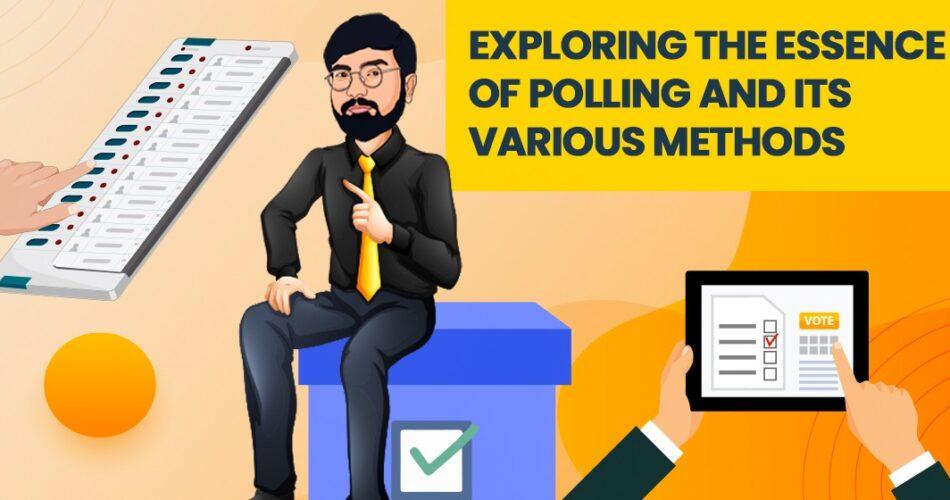Discover polling, the process of collecting public opinion data through telephone, online, or face-to-face methods. Learn about its significance in guiding decision-making and policy development, along with its limitations. Boost your political influence with Political Engineer’s accurate and favorable Political Social Media Marketing.
Introduction
Have you ever wondered how politicians and policymakers know what the people want? The answer lies in polling, a crucial aspect of democracy that empowers citizens to express their preferences and opinions on everything from political candidates to policy proposals. Come on a journey with us as we explore the fascinating world of polling, including its definition, the different methods used, and some recent examples from Indian politics that demonstrate its power and influence.
What is Polling?
The Polling process typically starts with selecting a sample group that accurately represents the larger population in terms of demographics, such as age, gender, income, and geographic location. The goal is to ensure that the sample group is as diverse and representative as possible to obtain the most accurate results.
Once the sample group has been identified, they are asked a series of standardised questions designed to elicit their opinions or attitudes on the topic at hand. The responses are then compiled and analysed to determine the overall sentiment of the public on the issue.
The insights obtained from polling can be used in a wide range of applications. Politicians and policymakers often use polling data to understand the public’s opinions on issues and to develop policies that reflect those views. Companies use polling data to develop new products and services that meet the needs and preferences of their target customers. Additionally, media outlets and journalists use polling data to provide insights into the public’s opinions on current events and news stories.
Types of Polling Methods
There are various polling methods used to collect data on public opinion. Here are some of the most common methods:
Telephone Polling:
Telephone Polling is a commonly used method of collecting data on public opinion or attitudes. It involves contacting a random sample of individuals through their phone numbers and asking them a set of structured questions. Telephone Polling is known for its cost-effectiveness and ability to reach a large number of people in a short time. However, it has become less effective in recent years due to the increasing use of mobile phones and caller ID, which has led to declining response rates.
Online Polling:
Online Polling is a popular method of collecting data on public opinion or attitudes due to its convenience and cost-effectiveness. It involves conducting surveys through the internet, with participants contacted through email, social media, or online ads. Online Polling can reach a large number of people quickly and is particularly effective for gathering opinions on Social Media and other online platforms. However, Online Polling can also suffer from self-selection bias, where only certain types of people participate, and sample sizes can be difficult to control.
Face-to-Face Polling:
Face-to-Face Polling is considered the most accurate method of collecting data on public opinion or attitudes as it allows pollsters to observe the participant’s non-verbal cues and body language. This method involves interviewing participants in person, either at their homes or in public places. Face-to-Face Polling is particularly useful for gathering data from hard-to-reach populations, such as the elderly or those living in remote areas. However, this method can be expensive and time-consuming, and the data collected may not be fully representative of the entire population.
Recent Examples of Polling in Indian Politics:
Polling plays a significant role in Indian Politics, and it is used to gauge public opinion on various issues, including political candidates and policy proposals. Here are some recent examples of polling in Indian politics:
The Gujarat Municipal Elections 2021:
Before the municipal elections in Gujarat, several opinion polls were conducted to predict the outcome of the elections. The polls were based on a sample of individuals selected from the population and asked a set of questions to gauge their voting intentions. The polls predicted that the BJP would retain its dominance in most of the municipalities, while the opposition Indian National Congress (INC) was predicted to win only a few municipalities. When the results were announced, the BJP emerged as the clear winner, winning a majority of the municipalities. The party won 485 out of the 576 seats in the municipalities, while the INC won only 75 seats. The BJP’s victory was in line with the predictions made by the opinion polls.
Exit Polls during the 2021 West Bengal Assembly Elections:
During the 2021 West Bengal Assembly Elections, numerous exit polls were conducted to predict the outcome of the election. These polls predicted a close contest between the ruling Trinamool Congress and the Bharatiya Janata Party (BJP). However, when the results were announced, the Trinamool Congress won a significant majority, surprising many political analysts and pollsters.
Conclusion:
Polling is an essential tool for understanding public opinion, guiding decision-making, and informing policy development. There are various polling methods used to collect data, including Telephone, Online, and Face-to-Face Polling. In Indian Politics, polling is used extensively to gauge public opinion on various issues. While polling can be a useful tool, it is important to remember that the results are not always accurate and can be influenced by various factors such as the sampling method and the wording of the questions.
But Political Engineer’s Political Social Media Marketing will always be accurate and in your favour, Contact us today to escalate your social media reach and influence to build your political tribe by capitalising the power of digitalization.

Follow us for more updates on Twitter
Get more interesting stuff on our official portal. Visit us on:
https://www.politicalengineer.in

